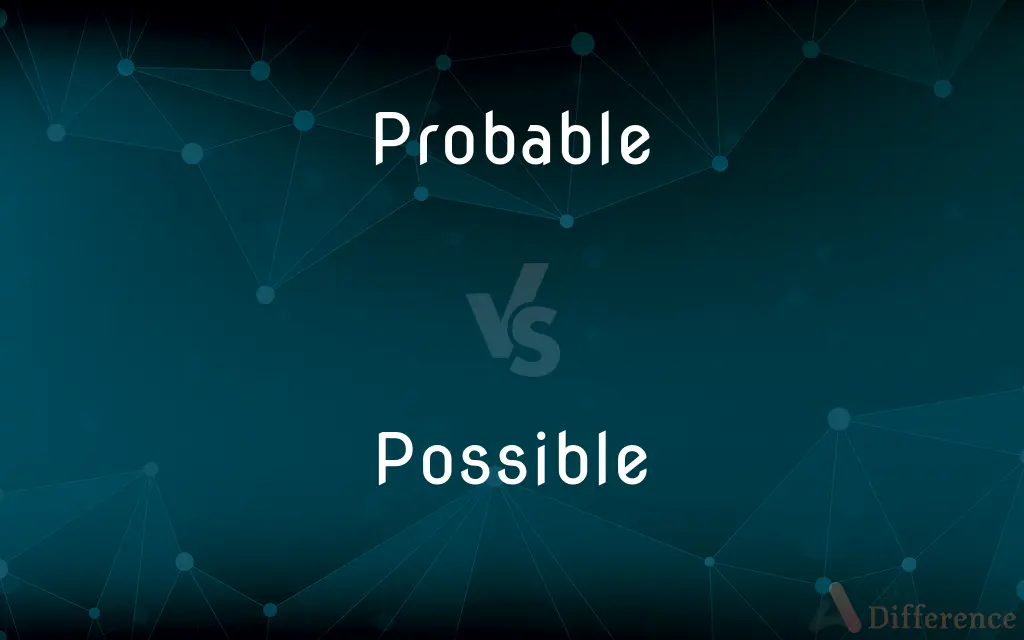Probable vs. Possible — What's the Difference?
By Tayyaba Rehman — Updated on October 9, 2023
Probable means something is likely to occur or be true, while possible means something might occur or be true but isn't certain.

Difference Between Probable and Possible
Table of Contents
ADVERTISEMENT
Key Differences
Probable implies a higher likelihood of occurrence or truth than Possible does. While both terms acknowledge uncertainty, "probable" leans towards a positive outcome or truth, whereas "possible" is more neutral.
Probable situations are those where given the present evidence or circumstances, the event or situation is expected to happen. On the other hand, Possible situations encompass a wider range of outcomes, including those that might be less expected.
An event labeled as Probable has a good chance of occurring based on current understanding or evidence. In contrast, if something is Possible, it means it can happen, but there might not be much evidence to support its likelihood.
Probable often conveys a degree of confidence in an outcome, while Possible simply denotes the capability or potential of an outcome without any associated confidence.
In many fields like statistics or risk assessment, Probable might be quantified with a specific percentage or range, indicating a higher likelihood. Possible, however, might not always have such a quantifiable measure attached to it.
ADVERTISEMENT
Comparison Chart
Definition
Likely to happen or be the case.
Able to occur or be done but not certain.
Likelihood
Higher likelihood.
General potential without an implied likelihood.
Usage
Conveys confidence in an outcome.
Indicates potential without specific confidence.
Quantifiable
Often given a specific likelihood.
Might not always be quantified.
Scope
Narrower, leaning towards certainty.
Broader, covering any conceivable outcome.
Compare with Definitions
Probable
Founded on likelihood.
Given his training, it's probable he'll win the race.
Possible
Capable of happening, existing, or being true without contradicting proven facts.
It's possible that he missed the bus this morning.
Probable
Presumed in the absence of further information.
The probable cause of the malfunction was a power surge.
Possible
That may exist or come into being.
Alien life is possible, though not confirmed.
Probable
Likely to be the case or to happen.
It's probable that the event will be postponed due to rain.
Possible
Able to be done or achieved.
It's possible to finish the project this week.
Probable
Reasonably expected.
It's probable that she will arrive by noon.
Possible
Occurring or being done now and then.
Such mistakes are possible even with careful planning.
Probable
Having more evidence for than against.
It's probable that the suspect was at the crime scene.
Possible
Capable of happening, existing, or being true without contradicting proven facts, laws, or circumstances
Is it possible to move faster than the speed of light?.
Probable
Likely to happen or to be true
War seemed probable in 1938. The home team, far ahead, is the probable winner.
Possible
Capable of becoming or of being made to be so; potential
Possible suspects in the case.
A possible site for the new capital.
Probable
Likely but uncertain; plausible.
Possible
Capable of occurring or being done in accordance with something specified. Used with the superlative
You'll get the best possible care at this hospital.
Probable
(Theology) Of or relating to opinions and actions in ethics and morals for whose lawfulness intrinsic reasons or extrinsic authority may be adduced.
Possible
Capable of happening but of uncertain likelihood
It is possible that you might feel some discomfort after the procedure.
Probable
Likely or most likely to be true.
It's probable that it will rain tomorrow.
The probable source of the failure was the mass of feathers in the intake manifold.
Possible
Permissible
Is it possible to enter the gallery at this hour?.
Probable
Likely to happen.
With all the support we have, success is looking probable.
Possible
Able but not certain to happen; neither inevitable nor impossible.
Rain tomorrow is possible, but I wouldn't bet on it.
It's not just possible, it's probable that there will be rain tomorrow.
Probable
Supporting, or giving ground for, belief, but not demonstrating.
Possible
(comparable) Capable of being done or achieved; feasible.
It's possible for anyone to learn to pay the bagpipes.
Probable
(obsolete) Capable of being proved.
Possible
Being considered, e.g. for a position.
Jones and Smith are both possible for the opening in sales.
Probable
Something that is likely.
Possible
Apparently valid, likely, plausible.
Probable
A person who is likely to appear or do a certain thing.
Possible
A possible one.
Probable
Capable of being proved.
Possible
A possible choice, notably someone being considered for a position.
Jones is a possible for the new opening in sales.
Probable
Having more evidence for than against; supported by evidence which inclines the mind to believe, but leaves some room for doubt; likely.
That is accounted probable which has better arguments producible for it than can be brought against it.
I do not say that the principles of religion are merely probable; I have before asserted them to be morally certain.
Possible
(rare) A particular event that may happen.
Probable
Rendering probable; supporting, or giving ground for, belief, but not demonstrating; as, probable evidence; probable presumption.
Possible
Capable of existing or occurring, or of being conceived or thought of; able to happen; capable of being done; not contrary to the nature of things; - sometimes used to express extreme improbability; barely able to be, or to come to pass; as, possibly he is honest, as it is possible that Judas meant no wrong.
With God all things are possible.
Probable
An applicant likely to be chosen
Possible
Something that can be done;
Politics is the art of the possible
Probable
Likely but not certain to be or become true or real;
A likely result
He foresaw a probable loss
Possible
An applicant who might be suitable
Probable
Apparently destined;
The probable consequences of going ahead with the scheme
Possible
Capable of happening or existing;
A breakthrough may be possible next year
Anything is possible
Warned of possible consequences
Possible
Existing in possibility;
A potential problem
Possible uses of nuclear power
Possible
Possible to conceive or imagine;
That is one possible answer
Possible
Permitted by law, rules, or circumstances.
It's possible to request a refund within 30 days.
Common Curiosities
Can something be both Probable and Possible?
Yes, if something is Probable, it is inherently Possible, but not everything Possible is necessarily Probable.
Is Probable a certainty?
No, while it indicates likelihood, it doesn't guarantee an outcome.
Can something be Possible but not Probable?
Yes, it means it can happen, but it's not likely.
What does Probable mean?
Probable means something is likely to occur or be true.
How does Possible differ from Probable?
Possible means something might occur or be true but isn't certain, while Probable implies a higher likelihood.
Does Possible mean it will definitely happen?
No, Possible just means it can happen but doesn't ensure it will.
Is there a term that indicates certainty?
Yes, terms like "definite" or "certain" indicate surety.
Which term indicates a higher likelihood?
Probable indicates a higher likelihood than Possible.
Can Probable be used in legal contexts?
Yes, for instance, "probable cause" in law indicates reasonable grounds.
In statistics, which term might be given a percentage?
Probable might be quantified with a specific percentage.
How do you use Possible in a sentence?
"It's possible to visit three cities in one day with proper planning."
How do you use Probable in a sentence?
"Given the dark clouds, it's probable that it will rain soon."
Which term conveys more confidence?
Probable conveys more confidence than Possible.
Are these terms subjective?
They can be, as they are often based on available evidence or personal judgment.
Are these terms used in risk assessments?
Yes, both terms are often used to evaluate and communicate risks.
Share Your Discovery

Previous Comparison
Creme vs. Cream
Next Comparison
Honey vs. HunnyAuthor Spotlight
Written by
Tayyaba RehmanTayyaba Rehman is a distinguished writer, currently serving as a primary contributor to askdifference.com. As a researcher in semantics and etymology, Tayyaba's passion for the complexity of languages and their distinctions has found a perfect home on the platform. Tayyaba delves into the intricacies of language, distinguishing between commonly confused words and phrases, thereby providing clarity for readers worldwide.
















































